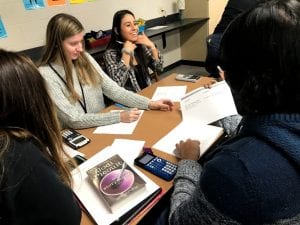3 Reflections from a Standards Based Grading Rookie
This fall, not only did I return to the classroom after a 2 year hiatus as an instructional coach, but I joined and led an Algebra II team that had agreed to launch Standards Based Grading. We were given a week over the summer to upend our current curriculum and start from scratch with the Common Core State Math Standards. With the help of our instructional coach, we had developed a strong curriculum map and began writing our first assessments, rubrics and lessons. We weren’t the first team to take the leap. The previous year, the Geometry team was not only the inaugural team to take the Standards Based Grading jump in our department, but also our school. While it wasn’t easy and took a great deal of time and effort to redesign the curriculum and assessments, it was deemed, overall, a success.
- Room for Growth At the end of the semester I had students reflect on our classroom norms as they related to themselves as a student and as a classmate and, of course, my instruction. On the back of the evaluation, I had them also share their thoughts on Standards Based Grading. I was particularly impressed with the thoughtful reflection of one student, “It favors the students’ education over their grade and the work they complete.” Yes! Another student wrote “(I like how) we retake the test we do to better ourselves.” They’re really starting to get the basic values that are the foundation of our practice: prioritizing learning over grades, and growth over time. But, in reflection, I’d like to continue to prioritize growth mindset language in my classroom. For example, I give pencils that say “Got an A with Mrs. J” for students who receive an “exceeding the standard” rating of a 3.5 or 4/4. I was thinking that I should also give a prize to those who’ve most improved from the first standard to the second in an effort to honor growth. My colleague, Patrick, also suggested that we call the second assessment we give for each standard as the “Growth Assessment.” I like that, too.
- Struggle with Student Motivation By far the biggest struggle that’s been voiced among my colleagues is the frustration over the lack of student homework completion. Math is a skill and, like any other skill, requires practice. I’ve told students more times than I can remember that mentally assenting to mathematics done correctly does not mean that you can perform the skill as well. You can’t just watch football and think you’re ready for the NFL. Nonetheless students think they can. We’ve talked about counting homework for points, but the teachers in Algebra I remind us that student work in their classes reflect little effort and, sadly, copying. They cringe at the thought of giving that caliber of work points towards their final grade. So, we return to making the argument to students about the importance of homework to improve understanding and summative performance. I would LOVE any insight any of you might have!
- Admiration and Respect for My Team I wasn’t the only one without experience in Standards Based Grading. On the team, which comprised 8 teachers, there was only one who was also on the Geometry team and he was a huge contributor, helping us to avoid pitfalls and encouraging us to focus on what he felt would give us the strongest start. That being said, everyone embraced the challenge and appeared eager to contribute to the major undertaking, which included a division of labor and group edits. While we certainly believed in the tenants of Standards Based Grading, that is, a student’s grade should reflect what they can perform, articulate and understand and not a student’s behavior, we had to be honest about the practical rubber-meets-the-road type pitfalls, such as student motivation. We also needed to reflect on the flow of curriculum, the shifts in our pedagogy, and our team dynamics. We didn’t always agree. In fact, often we didn’t. But, our team is professional, reflective and fun. We tangled until we could live with the outcome and may revisit it again. We are currently on the “act – reflect – new action” cycle of education and are content with that. Truly, I feel blessed to work with such a thoughtful team of educators.
Overall, I would deem semester I a moderate success with room for my personal growth. I hope to move forward in shifting mindsets towards growth and away from a focus on grades. I want students to know what they know and what they don’t know. I want them to learn the benefits of practice towards peek performance. And I want to continue the good work of a team that cares about what’s best for students, even if we don’t always agree on how. Also, I’m grateful to have the privilege to work with students. Teaching isn’t for the weak, but it’s the most rewarding job there is. It never gets boring, to be sure. Here’s to the future–have a great 2019!
